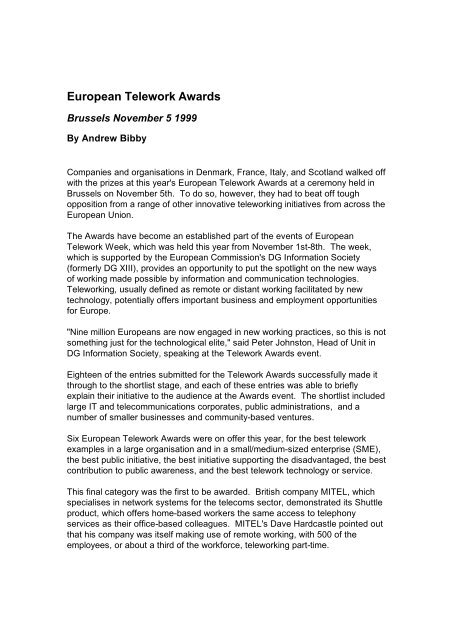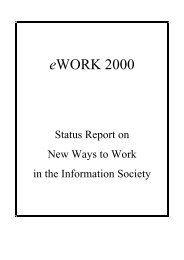Telework Award Winners - European Telework Week
Telework Award Winners - European Telework Week
Telework Award Winners - European Telework Week
You also want an ePaper? Increase the reach of your titles
YUMPU automatically turns print PDFs into web optimized ePapers that Google loves.
<strong>European</strong> <strong>Telework</strong> <strong>Award</strong>s<br />
Brussels November 5 1999<br />
By Andrew Bibby<br />
Companies and organisations in Denmark, France, Italy, and Scotland walked off<br />
with the prizes at this year's <strong>European</strong> <strong>Telework</strong> <strong>Award</strong>s at a ceremony held in<br />
Brussels on November 5th. To do so, however, they had to beat off tough<br />
opposition from a range of other innovative teleworking initiatives from across the<br />
<strong>European</strong> Union.<br />
The <strong>Award</strong>s have become an established part of the events of <strong>European</strong><br />
<strong>Telework</strong> <strong>Week</strong>, which was held this year from November 1st-8th. The week,<br />
which is supported by the <strong>European</strong> Commission's DG Information Society<br />
(formerly DG XIII), provides an opportunity to put the spotlight on the new ways<br />
of working made possible by information and communication technologies.<br />
<strong>Telework</strong>ing, usually defined as remote or distant working facilitated by new<br />
technology, potentially offers important business and employment opportunities<br />
for Europe.<br />
"Nine million <strong>European</strong>s are now engaged in new working practices, so this is not<br />
something just for the technological elite," said Peter Johnston, Head of Unit in<br />
DG Information Society, speaking at the <strong>Telework</strong> <strong>Award</strong>s event.<br />
Eighteen of the entries submitted for the <strong>Telework</strong> <strong>Award</strong>s successfully made it<br />
through to the shortlist stage, and each of these entries was able to briefly<br />
explain their initiative to the audience at the <strong>Award</strong>s event. The shortlist included<br />
large IT and telecommunications corporates, public administrations, and a<br />
number of smaller businesses and community-based ventures.<br />
Six <strong>European</strong> <strong>Telework</strong> <strong>Award</strong>s were on offer this year, for the best telework<br />
examples in a large organisation and in a small/medium-sized enterprise (SME),<br />
the best public initiative, the best initiative supporting the disadvantaged, the best<br />
contribution to public awareness, and the best telework technology or service.<br />
This final category was the first to be awarded. British company MITEL, which<br />
specialises in network systems for the telecoms sector, demonstrated its Shuttle<br />
product, which offers home-based workers the same access to telephony<br />
services as their office-based colleagues. MITEL's Dave Hardcastle pointed out<br />
that his company was itself making use of remote working, with 500 of the<br />
employees, or about a third of the workforce, teleworking part-time.
MITEL was up against two strong entries from France Télécom. Jérome<br />
Bergerot introduced the company's package of services for remote working<br />
(including videoconferencing and document sharing), collectively marketed as<br />
Boogie. When the votes were cast, however, the <strong>Telework</strong> <strong>Award</strong> went to<br />
France Télécom for their second entry. This was the telework trial which<br />
operated successfully in Lannion, Britanny, during part of 1998, when an<br />
employee of a locally based electronics company was able to work two days a<br />
week from home. The trial made use of the broadband communications<br />
possibilities available through the emerging ADSL technology, and was<br />
combined with telephone and videoconferencing links using Internet protocol.<br />
France Télécom tried to repeat its success in a second <strong>Award</strong>s category, that of<br />
the best telework example in a large organisation, with PC Nomade, its training<br />
and management package for remote sales staff. Also shortlisted was the<br />
Swedish National Energy Administration for its extensive telework programme,<br />
which now covers 127 of the organisation's 167 staff. The opportunity to<br />
telework from home (which is subject to a formal agreement on issues such as<br />
insurance, training and hours of working) was introduced following the creation of<br />
the Administration in 1998 and its relocation to the town of Eskilstuna, 130 kms<br />
west of Stockholm. <strong>Telework</strong>ing staff have the opportunity to work from home for<br />
a maximum of three days a week.<br />
The <strong>Award</strong> in this category was won, however, by Danish insurance company<br />
Danica. As Hubert Jensen explained, Danica has recently undertaken a major<br />
restructuring of its administration, focusing on customer service delivery. The<br />
company has routed calls previously handled by 57 offices to four call centres,<br />
enabling it to close almost forty sites. It has also equipped 150 of its 260 sales<br />
staff with ISDN lines at home, enabling them to operate effectively away from a<br />
conventional office base.<br />
Denmark also walked off with another <strong>Telework</strong> <strong>Award</strong>, for the best initiative<br />
supporting the disadvantaged. The New Pathways project in Næstved<br />
Kommune offers access to distance learning courses for local people suffering<br />
social exclusion, including the unemployed and early retired. The project, which<br />
has IBM and trade union federation HK among its partners, is focused on three<br />
Open Data Centres.<br />
Also shortlisted for this category were Online, a project providing information on<br />
employment and training opportunities for disabled people coordinated from<br />
Manchester, England, and the Periphera project, a EU-funded initiative which<br />
among other things has developed a virtual call centre for disabled people in<br />
Hasselt, Belgium.
The commune of Naples took the <strong>Telework</strong> <strong>Award</strong> for the best supporting public<br />
initiative, for its <strong>Telework</strong> and Local Development project. As Salvatore di Maio,<br />
speaking at the awards event for the authority, pointed out, Naples currently<br />
suffers a very high unemployment rate, 42%. The telework initiative includes a<br />
municipal teleservices centre.<br />
The region of Bages in central Catalunya, which has its own telework<br />
development programme TeletreBages, was also shortlisted for the <strong>Award</strong>. The<br />
project, which is a joint public/private initiative, aims to develop telework<br />
('teletreball' in Catalan) in Bages, an old industrial region based originally on<br />
textiles.<br />
A third strong contender for this <strong>Award</strong> came from the Nord-Rheinland Westfalia<br />
state of Germany, where the Teleskop scheme has been providing a telework<br />
information service for small and medium-sized enterprises.<br />
Denmark completed its hat-trick of <strong>Award</strong>s this year when TeleDanmark won the<br />
award for best contribution to public awareness. The company has been running<br />
a campaign to promote the idea of telework, which has included the publication<br />
of a telework guide (also available on the Internet). Also shortlisted in this<br />
category was the recent Dutch study which has looked at the possibility of<br />
teleworking reducing traffic congestion in the Amsterdam/Utrecht/The Hague<br />
triangle. The study, which involved surveying the commuting patterns of 10,000<br />
people from 55 companies, attracted considerable TV and press coverage in the<br />
Netherlands.<br />
Also competing in this category for the award was the UK specialist magazine All<br />
About Working From Home, which as its name suggestes is specifically focused<br />
on the information needs of home-based workers.<br />
If the <strong>European</strong> <strong>Telework</strong> <strong>Award</strong>s attract entries from major corporate<br />
enterprises, the event also offers a platform for innovative small enterprises to<br />
promote themselves and their work. Shortlisted for the category of best telework<br />
example in an SME were the Italian employment services agency Ali Spa and an<br />
IT venture in Norrbotten in Sweden's far north. The <strong>Award</strong> went, however, to the<br />
Work-Global ICT facilitation service in the Scottish Western Isles. Donnie<br />
Morrison of Work-Global described how telework was providing employment<br />
opportunities for people living in these beautiful but remote islands. The<br />
teleworkers’clients included firms not only elsewhere in Britain but also in<br />
Germany and north America, he said.<br />
The voting system for the <strong>Award</strong>s took into account the views of an expert panel<br />
of judges, the votes of the audience listening to each presentation but also, in an<br />
innovative use of technology, votes cast previously on-line, via the Internet. The<br />
<strong>Award</strong>s ceremony itself was also web-cast on the Internet.
"It is important to learn from best practice, and we must increasingly focus on the<br />
best in Europe," said Peter Johnston of DG Information Society. "All the finalists<br />
deserve congratulations for their courage and commitment which has enabled<br />
them to come so far,” he added.








